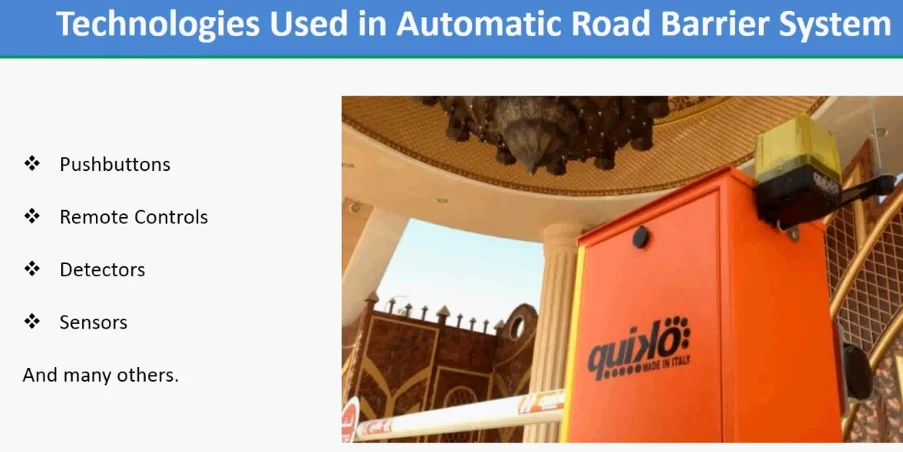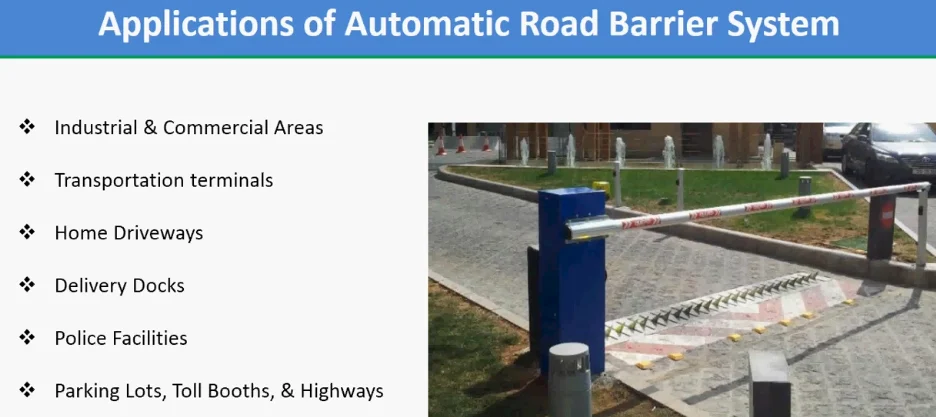Road barriers, also known as traffic restrictors or guardrails, are vital safety features on roads and highways. These barriers are specifically designed to prevent vehicles from leaving the roadway, keep pedestrians safe, and reduce the severity of accidents. The type of road barrier used depends on road conditions, traffic volume, and specific safety requirements. These barriers are crucial for maintaining smooth traffic flow and preventing accidents in urban areas like Dubai and across the UAE.
All Types of Road Barriers
Road barriers are essential for protecting and managing traffic. They are designed to prevent injuries, maneuver vehicles, and protect pedestrians. Concrete barriers are strong and sturdy and are often used on highways to divide lanes and reduce injuries at intersections. Metal barriers are flexible and absorb impacts commonly seen on roadsides and curves. These barriers reduce engine damage and passenger accidents.
Plastic road barriers are lightweight and easy to move and are used in short areas or creation occasions. Cable barriers use metal cables to absorb energy and effectively prevent cars from driving into oncoming visitors. Water-filled barriers increase stability and are used in transient installations. Each species meets unique objectives to ensure street safety and visitor control.

Guardrails Barriers in UAE, Dubai
Guardrails are among the most commonly used road barriers, playing an essential role in improving road safety. They are designed to divert vehicles away from potential hazards and keep them on track. In UAE, and Dubai, guardrails are often installed on highways, curves, bridges, and other high-risk areas where vehicles might run off the road.
Types of Guardrails:
- W-beam Guardrail: The W-beam guardrail is a popular choice for road safety in UAE. It consists of a “W” shaped steel beam that is anchored to the ground and is designed to flex and absorb the force of a vehicle’s impact. This type of guardrail is ideal for high-speed areas like highways in Dubai.
- Thrie-beam Guardrail: The Thrie-beam guardrail has an additional, stronger flange compared to the W-beam. This design makes it more robust and effective in handling higher-impact collisions. It is commonly used in high-risk zones in UAE, and Dubai, where there is a greater likelihood of severe crashes.
- Box Beam Guardrail: A box beam guardrail is a more solid structure with an enclosed design. It’s used in areas where heavy impact resistance is required, such as near construction zones or areas with high-speed traffic in Dubai.
Concrete Barriers in UAE, Dubai
Concrete barriers are widely used where maximum protection is necessary, including highways, manufacturing sites, and urban roads. These rigid structures provide a solid barrier to prevent vehicles from crossing into dangerous zones. In Dubai and across the UAE, concrete barriers are often installed in high-risk traffic areas.
Types of Concrete Barriers:
- Jersey Barrier: The Jersey barrier is one of the tallest non-standard concrete barriers. It is commonly used to divide highways and construction zones in Dubai. Its horizontal design helps direct vehicles back onto the road rather than allowing them to drive over the barrier.
- F-shape Barrier: The F-shape barrier is similar to the Jersey barrier but has a unique design. It is used in toll roads and roadside areas to reduce the risk of vehicle impact. The shape of the F-barrier helps minimize damage to vehicles upon impact.
- Precast Concrete Barriers: These artificial concrete barriers are manufactured off-site and transported to the required location. Precast barriers offer installation flexibility, making them ideal for both temporary and permanent projects in UAE, and Dubai.

Cable Barriers in UAE, Dubai
Cable barriers are made of high-tension steel wires stretched between poles. They are highly effective in preventing vehicles from crossing over to oncoming traffic lanes, especially in areas with a high likelihood of severe accidents. In the UAE, cable barriers are commonly used on highways and rural roads where high-speed collisions are a concern.
Advantages of Cable Barriers:
- Flexibility: Cable barriers are flexible and can absorb impacts, reducing the severity of collisions. This makes them a safer option in areas prone to high-impact crashes in Dubai.
- Vehicle Deflection: The cable barrier’s design helps deflect vehicles away from danger, providing an extra layer of protection for drivers and pedestrians in Dubai and other parts of the UAE.
- Adaptability: Cable barriers can be easily installed in areas where space is limited, making them ideal for use in both urban and rural settings in the UAE.
Fencing Barriers in UAE, Dubai
Fencing barriers serve as protective measures for pedestrians, animals, and vehicles. In Dubai, they are particularly important for controlling traffic and ensuring pedestrian safety in busy urban environments.
Types of Fencing Barriers:
- Pedestrian Fencing: Used in urban areas, pedestrian fencing prevents individuals from walking onto roads or highways, thus enhancing pedestrian safety in cities like Dubai.
- Wildlife Fencing: In areas where highways pass through natural habitats, wildlife fencing is used to prevent animals from crossing roads. This is crucial for preventing accidents in areas of the UAE where wildlife habitats are near roadways.
Energy Absorbing Barriers in UAE, Dubai
Energy-absorbing barriers are designed to reduce the force of impact during collisions, protecting both the vehicle and its occupants. These barriers are especially useful in high-risk areas such as curves, ramps, or near-fixed objects. In Dubai, where fast-moving traffic is common, energy-absorbing barriers are critical for reducing the severity of accidents.
Types of Energy-Absorbing Barriers:
- Rubber Barriers: Rubber barriers compress upon impact, absorbing the energy of collisions. These are often used in areas with moderate traffic, such as residential roads in Dubai.
- Plastic Barriers: Like rubber barriers, plastic barriers absorb impact, but they are lighter and more flexible. They are ideal for areas with low traffic or temporary setups in Dubai and other parts of the UAE.
Conclusion:
Choosing the right type of road barrier is essential for improving road safety and reducing the risk of accidents. From standard guardrails to energy-absorbing barriers, the design of the barrier must be tailored to the specific conditions of the road, traffic volume, and environmental factors.
In UAE, and Dubai, road authorities and contractors must consider factors like traffic speed, road layout, and potential hazards when selecting the appropriate barriers. The correct barriers not only enhance safety but also help reduce the severity of accidents, protecting both drivers and pedestrians.
By using the right type of barrier, road safety can be significantly improved in urban and rural areas throughout the UAE, making roads safer for all.